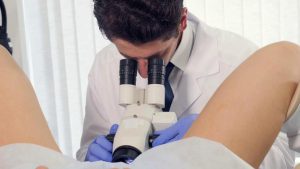Exacerbation of gynecological infections – an autumn problem

In the autumn, often after vacation, there is an exacerbation of inflammatory diseases of the female genital organs. This is the most common reason for women to visit a gynecologist. The main factor is microbes, which mainly enter the woman’s body through sexual contact.
Factors contributing to the spread of infection are a decrease in immunity, travel, air travel, hypothermia, concomitant diseases, including pathology of the pelvic organs: intestines, bladder, as well as intrauterine interventions: abortion, diagnostic curettage, HSG, placement and removal of an intrauterine contraceptive. I would not recommend self-medication, because the cause can be different types of bacteria, viruses, fungal infection. And in each specific case, you need to conduct an examination, pass tests, do an ultrasound of the pelvic organs, so that you can then prescribe a competent treatment.
Candidal colpitis is one of the most common reasons for visiting a gynecologist, caused by fungi of the genus Candida. It can occur after antibiotic therapy, self-medication, hypothermia, decreased immunity, the presence of hypovitaminosis, hypoestrogenism. The diagnosis is made on the basis of the clinic: itching, discomfort, profuse cheesy discharge from the vagina, as well as microscopy of smears, in the presence of recurrent candidal infection, bacterial culture is necessary, with the selection of the sensitivity of the drugs. Treatment is carried out with antifungal drugs, followed by the restoration of normal microflora.
Chlamydia is one of the most common infections. It promotes the formation of adhesions in the abdominal cavity, which can lead to obstruction of the fallopian tubes, infertility, ectopic pregnancy, hydrosalpinx formation, complications during pregnancy and postpartum complications in the mother and child. This infection does not have a vivid clinical picture – it is often asymptomatic. To diagnose chlamydial infection, it is necessary to take PCR – smears and blood for ELISA analysis. A course of antibiotic therapy and local treatment are prescribed. You need to treat your partner.
Ureaplasma and mycoplasma also belong to genital infections. The danger of these infections is that they cause inflammation of the female genital organs, and, as a result, infertility, premature termination of pregnancy, and postpartum complications. They have a negative effect on the fetus and placenta, and can cause chlamydial, mycoplasma pneumonia. Treatment is carried out with antibacterial drugs.
mycoplasma pneumonia. Treatment is carried out with antibacterial drugs.
Bacterial vaginosis is a disease caused by a violation of the biocenosis of the normal microflora of the vagina. The main complaint of a woman is an increase in discharge from the genital tract, sometimes there may be itching or discomfort in the genital area. There are no signs of inflammation. When viewed in the mirrors, there is no hyperemia, there is no edema of the vaginal mucosa. The presence of bacterial vaginosis proves a positive amino test. For diagnosis, it is necessary to take a smear on the flora. Local treatment is carried out, followed by microflora normalization.
Viral infections https://en.wikipedia.org/wiki/Viral_disease can be latent. Most often it is herpes simplex virus, human papillomavirus, cytomegalovirus infection. Viruses cause inflammation of the cervix, and also have a damaging effect on the fetus, causing, in addition to miscarriages, fetal malformations. All viral infections are difficult to treat, prone to relapses and exacerbations. These infections are diagnosed using PCR smears and ELISA method. Treatment of a viral infection is complex, it is carried out with antiviral drugs and increasing immunity.
Trichomoniasis and gonorrhea are specific sexually transmitted infections of the genitourinary organs. Diagnosis is made by microscopic examination of vaginal discharge, cervix and urethra, as well as PCR smears. Treatment should be carried out as early as possible and in full, so as not to cause a chronic disease.


